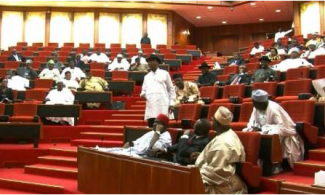
Restrictive law in the Senate would criminalize free expression.
Abuja, Nigeria – Today a coalition of nearly 20 Nigerian, African, and international rights groups delivered a letter to key officials in the Nigerian Senate, citing concerns about free expression and the criminalization of free expression under the Frivolous Petitions Prohibition Bill.
“The Frivolous Petitions Prohibition Bill is another attempt at limiting freedom of expression, especially on a platform that has allowed citizens to connect with others to take appropriate joint action against government inaction at various levels,” said ‘Gbenga Sesan, Executive Director of Paradigm Initiative Nigeria. “Continued action on the bill by the Senate will further reinforce the trend of repressive legislation in the online space in Nigeria.”
“Recent online protests against this bill would, ironically, be jailworthy offenses if this were to go through,” said Deji Olukotun, Senior Global Advocacy Manager at Access Now. “At a time when Africa’s largest democracy has committed to fighting corruption, the bill could criminalize reporting by journalists and prevent citizens from holding their officials accountable.”
The Frivolous Petitions Prohibition Bill — which is popularly called the Social Media Bill — received its second reading in the Senate last month, paving the way for a third and final reading and eventual referral to the House of Representatives, the second chamber in the legislature. It would impose penalties of up to N2,000,000 ($10,000) and up to two years in jail.
The open letter was convened by Paradigm Initiative Nigeria and Access Now, and urges Senators to drop the bill from consideration, but also underscores that the country’s Cybercrime Act, passed this year, imposes even stiffer penalties of up to 10 years.
“The Cybercrime Act has not been used to convict a single cyber-criminal in the last six months since it was passed,” added ‘Gbenga Sesan. “Yet within the same space of time, there have been arrests and detention of at least three bloggers for writing what has been deemed offensive to the ‘powerful.’”
Signers of the open letter include Access Now, Association for Progressive Communications, Centre for Information Technology and Development, Civil Society Legislative Advocacy Centre (CISLAC), Collaboration on International ICT Policy in East and Southern Africa (CIPESA), Committee to Protect Journalists, Electronic Frontier Foundation, Enough is Enough Nigeria, Freedom House, International Service for Human Rights, Internet Sans Frontieres, KICKTANet, Media Rights Agenda, Paradigm Initiative Nigeria, Pen International, Pen Nigeria, Rudi International, Social Media Exchange (SMEX), Web Foundation, West African Journalists’ Association, Zimbabwe Human Rights NGO Forum.
You can read the open letter here.
Media contact
Deji Olukotun, Senior Global Advocacy Manager, Access Now